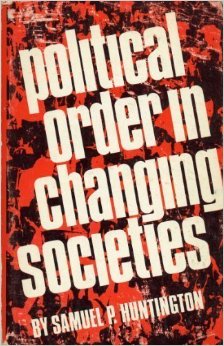Huntington, Samuel P. Political Order in Changing Societies. New Haven: Yale University Press, 1968.
Huntington’s foundational work on political development was controversial when it first appeared, in the midst of the Vietnam War, because it argued that order itself was an important goal of developing societies, independent of the question of whether that order was democratic, authoritarian, socialist, or free-market. Thirty years later, the need for order is as acute as ever, and the means of achieving it elusive. This is particularly true for the formerly communist world, where excessively rigid political order has produced populations that simultaneously despise and crave a strong hand and have, since the fall of the Berlin Wall, descended into deep disorder. Huntington’s characterization of the Soviet Union and other communist states as highly developed polities looks odd in retrospect, since their surface institutional calm masked a high degree of internal rot and illegitimacy. The book, nonetheless, has shaped the understanding of a generation of students on the nature of party systems and contains a classic chapter on America as a Tudor society.
– From Introduction to latest edition.
Online:
Free Online [pdf]
Amazon

